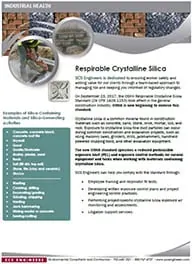

Silica dust exposes over two million construction workers per year and is an area of high concern for OSHA. Workers create the dust when cutting, sawing, grinding, drilling, and crushing stone, rock, concrete, brick, block, and mortar.
Although crystalline silica is a common mineral found in the earth’s crust, common construction operations and cutting or crushing stone could result in unsafe conditions for workers. Industrial grade sand used in certain foundry work and hydraulic fracturing (fracking) is also a source of exposure.
OSHA’s standard (29 CFR 1926.1153) requires employers to protect workers from overexposure to respirable crystalline silica during construction, demolition, blasting, and tunneling activities. SCS Engineers Health and Safety (H&S) practice offers services and training to protect your workers and the public from exposure, therefore reducing your business risk.
SCS helps businesses fully implement control methods as the OSHA standard dictates, and we can measure and assess workers’ exposure to silica to determine which controls work best.

The value of using an SCS Engineers team is that we are not only qualified H&S practitioners; we are in the construction business too. We understand what is necessary to protect workers and your business under many different construction operations and conditions whether they are on petrochemical, utility, transportation, or brownfield project sites.
SCS can also create a written exposure control plan to identify all relevant tasks involving potential exposure and the methods to protect workers.
Our services are comprehensive and include accredited laboratory analysis and any necessary regulatory reporting. We also offer various types of training for workers to implement your company’s exposure control plan.
For more information, visit our Industrial H&S website pages, contact us at service@scsengineers, or call 702-645-1521 or toll-free at 800-767-4727.
We’re here to help.